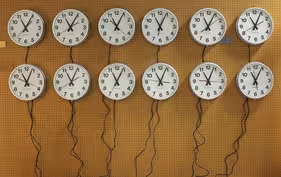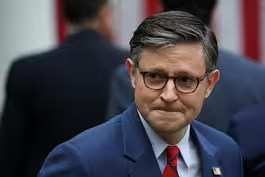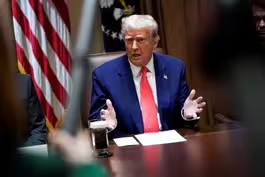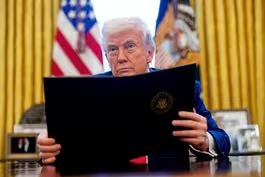
Trade war solution 'may take a while,' AEI's Scissors says
Clip: 4/10/2025 | 5m 50sVideo has Closed Captions
Solution to U.S.-China trade war 'may take a while,' AEI's Derek Scissors says
Markets flashed more warning signs over the enormous tariffs placed on Chinese imports by President Trump. To discuss the concerns around China's trade relationship with the U.S., Amna Nawaz spoke with Derek Scissors, a senior fellow for the American Enterprise Institute, a conservative think tank.
Problems playing video? | Closed Captioning Feedback
Problems playing video? | Closed Captioning Feedback
Major corporate funding for the PBS News Hour is provided by BDO, BNSF, Consumer Cellular, American Cruise Lines, and Raymond James. Funding for the PBS NewsHour Weekend is provided by...

Trade war solution 'may take a while,' AEI's Scissors says
Clip: 4/10/2025 | 5m 50sVideo has Closed Captions
Markets flashed more warning signs over the enormous tariffs placed on Chinese imports by President Trump. To discuss the concerns around China's trade relationship with the U.S., Amna Nawaz spoke with Derek Scissors, a senior fellow for the American Enterprise Institute, a conservative think tank.
Problems playing video? | Closed Captioning Feedback
How to Watch PBS News Hour
PBS News Hour is available to stream on pbs.org and the free PBS App, available on iPhone, Apple TV, Android TV, Android smartphones, Amazon Fire TV, Amazon Fire Tablet, Roku, Samsung Smart TV, and Vizio.
Providing Support for PBS.org
Learn Moreabout PBS online sponsorshipAMNA NAWAZ: Let's focus now on those concerns around China's trade relationship with the U.S. and what these responses could mean.
Derek Scissors watches all of this closely as a senior fellow for the American Enterprise Institute.
That's a conservative think tank.
And he joins me now.
Derek, welcome, and thanks for joining us.
Help us understand a little bit about the relationship between these two economies, the U.S. and China, the world's two largest economies.
How interdependent, how intertwined, rather, are they on each other?
DEREK SCISSORS, American Enterprise Institute: Well, on a matter of a daily basis, they're pretty intertwined.
The U.S. is the biggest consumer market in the world.
China is the biggest producer in the world.
They're the biggest exporter.
We're the biggest importer.
And so if you just look day-to-day, it looks like they're really intertwined.
Now, you can make a pretty good argument that Chinese goods can be substituted for, not quickly, not immediately, the way the president thinks.
But I think over time, the U.S. and China could be considerably less intertwined than they are today.
AMNA NAWAZ: And do you see that as one of the goals of this administration with these tariffs to try to decouple the two economies?
DEREK SCISSORS: I don't think so.
There are certainly people in the administration who have that goal.
For disclosure, I have that goal, at least partial decoupling.
That's never been the president's goal.
He presided -- he wanted to make a big trade deal in the first term and export more to China.
Now he's talking about, I want to talk to China.
I want to make a deal.
None of that sounds like decoupling.
Decoupling would be, hey, here's some tariffs, maybe not 145 percent, but 54 percent or whatever, and we're not negotiating.
So it sounds to me like he wants to make a deal just like he did in his first term.
AMNA NAWAZ: So, as you mentioned, China, of course, is the primary global producer of a lot of things Americans consume, toys, to cell phones, to computers.
Walk me through this now.
If tariffs do drive the prices up, imports, consumption of those goods here in the U.S. goes down, can that supply line, as you mentioned, can it shift to other nations where the tariffs are lower or could be negotiated lower, like Vietnam or Indonesia, for example?
DEREK SCISSORS: Absolutely.
The Chinese are very good at this, and they got a practice run in the first Trump term with much lower tariffs.
Their companies are nimble.
They're used to foreign investment.
There's large-scale Chinese foreign investment overseas.
They're going to try, for sure, to move production elsewhere.
Now, if the U.S. enforces its trade policies, that won't work.
The U.S. has never enforced trade policies at a scale we're talking about before.
This is another thing that President Trump has done that no president has done, except we haven't actually pulled it off yet.
So China is going to try to move production and shift trade through other countries.
We have a response, but it's going to be a challenging response.
If we do enforce our trade laws against China, that opens the door for countries like Indonesia to produce their own goods, and, of course, also for production in the U.S.
But this is going to take some months to shake out, assuming there's no U.S.-China deal.
AMNA NAWAZ: So, in the months that it takes to shake out, I understand the goods that are already in transit are exempted from many of these tariffs.
So when should American consumers expect to see any kind of increase in prices?
DEREK SCISSORS: Well, it's obviously going to depend on the goods.
There was a lot of stockpiling in anticipation of tariffs.
Now, I don't think anyone thought it was going to go to 145, for example.
But there was stockpiling by a lot of firms.
I don't think you're going to see prices rise due to trade in the next few weeks.
There may be firms raising prices on their own because they're expecting a big trade hit coming.
But trade costs are going to start rising in May.
And I would think that people would see it in June if it's actually about trade.
If it's about firms getting out in front of trade, of course, it could happen tomorrow.
AMNA NAWAZ: Derek, what about the impact of Chinese tariffs on the American economy?
There's an estimated 900,000-plus American jobs that are supported by U.S. exports to China, especially in agriculture and livestock.
Are those jobs in jeopardy?
DEREK SCISSORS: I think the big hit here is to agriculture.
We tend to export commodities to China, which is one of the problems for the Trump administration.
They don't want us to be a commodities exporter.
They want us to build things.
And so agriculture does face a threat.
In the past, there's been the sort of quiet dealmaking, where China makes an agriculture exception or it buys U.S. agricultural products that are sent to a third country.
This is the worst standoff we have had.
So I wouldn't guarantee that farmers are going to be OK, and they're the ones that the most threat from U.S. exports to China.
AMNA NAWAZ: In the minute or so we have left, I have to ask, where do you see this going next?
Does it continue to ramp up, or is there an off-ramp ahead for either the U.S. or China?
DEREK SCISSORS: Well, this is one of those weird things where it's pretty clear both countries want an off-ramp, but they want the other country to take the first step.
I think the Chinese are worried that Trump will say something somewhat embarrassing about how much they need to deal.
And the U.S. is legitimately, in my view, angry at Chinese trade practices.
So it's hard to imagine there won't be negotiations, but it might take a while.
Maybe both sides have to suffer enough that they're willing to take that first step.
And then the next issue is, those negotiations are going to be tough.
You can announce a deal.
We announced a deal, the phase one trade deal in Trump's first term.
It didn't work.
So we're taking a long time to get to the first step of the negotiations.
We may not quite get to an outcome where there's a deal that holds.
The market will rally on good news, but the final good news may not come.
AMNA NAWAZ: All right, that is Derek Scissors of the American Enterprise Institute joining us tonight.
Derek, thank you so much.
Good to speak with you.
DEREK SCISSORS: Thank you.
Ditch the switch? Senators divided over daylight saving time
Video has Closed Captions
Clip: 4/10/2025 | 5m 14s | Ditch the switch? Senators debate future of daylight saving time (5m 14s)
Food banks feel pain of high prices, government cuts
Video has Closed Captions
Clip: 4/10/2025 | 6m 22s | Food banks feel the pain from higher prices and cuts to government programs (6m 22s)
House GOP passes budget framework to work on Trump agenda
Video has Closed Captions
Clip: 4/10/2025 | 4m 17s | House Republicans pass budget framework to begin work on Trump’s congressional agenda (4m 17s)
Musician Nile Rodgers reflects on the roots of his artistry
Video has Closed Captions
Clip: 4/10/2025 | 4m 23s | Musician Nile Rodgers reflects on the roots of his artistry (4m 23s)
Senegal struggles with climate despite promises of help
Video has Closed Captions
Clip: 4/10/2025 | 8m 37s | Senegal struggles to cope with climate change despite promises of help from other nations (8m 37s)
Trump defends tariffs on China as markets take another dip
Video has Closed Captions
Clip: 4/10/2025 | 3m 59s | Trump defends enormous tariffs on China as markets take another dip (3m 59s)
Trump directs DOJ to investigate ex-administration officials
Video has Closed Captions
Clip: 4/10/2025 | 5m 26s | Trump directs DOJ to investigate former administration officials who criticized him (5m 26s)
Providing Support for PBS.org
Learn Moreabout PBS online sponsorship
- News and Public Affairs

FRONTLINE is investigative journalism that questions, explains and changes our world.

- News and Public Affairs

Amanpour and Company features conversations with leaders and decision makers.












Support for PBS provided by:
Major corporate funding for the PBS News Hour is provided by BDO, BNSF, Consumer Cellular, American Cruise Lines, and Raymond James. Funding for the PBS NewsHour Weekend is provided by...






